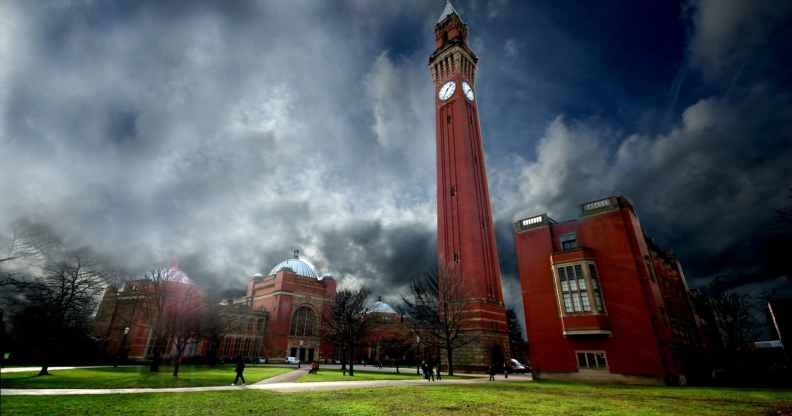University of Birmingham apologises for historically carrying out barbaric conversion therapy

The University of Birmingham, where conversion therapy research took place until 1980. (Getty)
The University of Birmingham has formally apologised for conversion therapy practiced at the institution, which continued until the 1980s.
On Wednesday (8 June), a report was published by Birmingham researchers into the history of conversion practices at the university.
The research was prompted by a conversion therapy survivor, speaking out under the pseudonym “Chris”, who demanded an apology from the University of Birmingham in 2020 after undergoing shock therapy to “treat” his sexual orientation.
Researchers found that psychologist Dr Maurice Philip Feldman, who worked in the Department of Psychology at the University of Birmingham between 1966 and 1983, and psychiatrist Dr Malcolm J MacCulloch, who worked at the university’s Institute for Child Health in the Department for Paediatrics and Child Health between 1967 and 1971, had conducted research into “anticipatory avoidance” (AA) therapy to “cure” homosexuality.
The therapy involved giving an apparatus with a chair and a screen, which would give subjects electric shocks via bands connected to their bodies.
Subjects would either be shocked when looking at an image of a person of the same sex, or would be given the chance to avoid the shock by quickly skipping to the next slide.
However, researchers noted: “Any sense of control patients may have had was broken by the researchers, who would shock at random, based on extant conditioning principles, in the belief that this would encourage the retention of heterosexual behaviour.”
Researchers found 13 publications from Feldman and MacCulloch which focused on the so-called “therapy” in treating homosexuality, and even identified a case where the technique was used on a 12-year-old child to treat “exhibitionism”.
Further, as late as 1980, Feldman worked with the endocrinology department at the University of Birmingham’s medical school on research into “ideas about the physical build of gay men being indicative of hormone delivery in the womb; the theory was that injecting oestrogen into gay men would see a biological ‘female pattern of response’.”
Little more is known about his endocrinology research, as the study was never published.
In a statement, the University of Birmingham’s vice chancellor Adam Tickell said: “We understand that many of our staff and students will be distressed and angered to learn of the findings of the research into these practices, where the aim is to change a person’s sexual orientation or to suppress gender identity.
“Today I formally acknowledge and apologise for the University’s role in the historical research and practices detailed in this report and the harm that they caused.
“I would like to commend the bravery of those from the LGBTQ+ community who have spoken out about their own experience of these practices.
“We understand the impact that conversion therapy has on individuals and unreservedly condemn this practice. We are unequivocal that conversion therapy is unethical, degrading, and harmful.”
The steering group responsible for the report recommended that as well as acknowledging and apologising for the university’s history of conversion therapy, the university should “develop a stated policy to provide access and material support to further academic enquiries into this history”, and should support efforts to ban conversion therapy comprehensively in the UK.
Tickell said the university’s executive board would “consider and respond to these [recommendations] over the coming weeks”.

